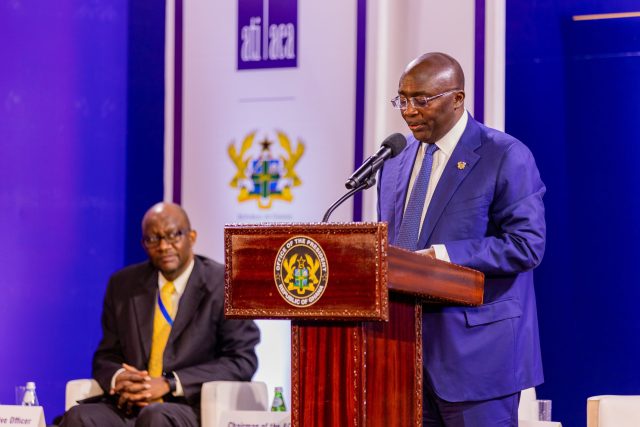Vice President Dr Mahamudu Bawumia Tuesday unveiled ched the National Rental Assistance Scheme (NRAS), in Accra, to provide safe, secure and affordable rental housing for lower income households and youth in Ghana.
The Scheme will provide rent advance loans to eligible Ghanaians, 18 years and above, with verifiable and regular income.
These loans will be repaid on a monthly basis by the beneficiary, not exceeding 30 per cent of his/her household income, to match the tenure of the rent.
The Government has allocated GHS30 million as initial capital to support applicants.
The implementation of the first phase of the Scheme will cover the Greater Accra, Eastern, Western, Ashanti, Bono East and Northern regions before being extended to the 10 regions.
The management of the Scheme has been outsourced to Rent Masters Ghana Limited, a private sector entity, which is responsible for the day-to-day operations of the Scheme.
The company will, among other things, handle customer application processes, disbursement of rent advance directly to landlords, as well as the preparation and submission of periodic reports on the implementation of the Scheme to the Project Management Committee.
It will also serve as a bridge between landlords and tenants to satisfy the interest of both parties.
Vice President Bawumia said successive governments had instituted housing policies geared towards increasing access to various housing options.
However, those efforts were mainly concentrated on home ownership services and had not achieved the desired impact in addressing the market imbalances of the rental housing market.
Globally, rental housing formed an integral part of a well-functioning housing market and played a critical role in increasing access to affordable housing options, particularly for the youth and low-to-middle-income groups.
The Vice President said the Akufo-Addo-led Administration, as a people-focused Government, had been working towards providing meaningful shelter to citizens, which formed a significant part of government’s developmental goals to address the problems associated with the housing sector, especially rental housing.
“When I visited the Rent Control Department in July 2020, I noted the overall importance of the rental housing market in our quest to increase access to housing options,” he said.
“I reiterated plans of the Government to make it more effective and efficient, while also reviewing the Law governing rent management in the country to make it more relevant to evolving trends.”
He said the problem of landlords demanding two years rent advance deprived many people, especially the youth, access to rental housing.
To address the challenge, Vice President Bawumia said the Government, in 2020, started planning to introduce a new programme to bridge the information and financial gap between tenants and landlords.
These measures would enhance tenants’ creditworthiness and reduce the large rent advance requests by landlords.
These ideas found expression in the 2020 Manifesto of the New Patriotic Party, and subsequently in the national budget.
Therefore, the Government, acting through the Ministry of Works and Housing, established the National Rental Assistance Scheme as a policy intervention to resolve the challenge.
In partnership with the private sector, the Scheme would provide low-interest loans to eligible Ghanaians to enable them to pay rent in advance.
The rent advance loans would be paid directly into landlords’ bank accounts, who would also have to register with the Scheme.
The Government, Dr Bawumia said, had made significant strides as far as the housing sector and rent management of the country was concerned.
Acting through the Ministry of Works and Housing, it had submitted to Parliament for consideration and passage of a Rent Bill, to replace the existing Rent Act 1963 (Act 220).
He said when passed into law, it would enhance the service delivery standards of the Rent Control Department.
He commended the sector Minister, Mr Francis Asenso-Boakye, for his leadership in ensuring the roll-out of the initiative, which would streamline the rental sub-sector in respect of quantity and quality of rental housing.
“I am particularly excited to learn of the eligibility criteria that have been adopted in the selection of beneficiaries for the Scheme,” he said.
“It does not only support the call to synchronize all platforms with the National Identification System but also the data produced from the implementation of the Scheme will facilitate government’s efforts at expanding our revenue stream through the improved collection of rent tax.”
The Vice President said the introduction of the NRAS was made possible because of the national identification system, a digital property address system and mobile money interoperability, which had practically given a bank account to all eligible Ghanaians.
These systems addressed, to a large extent, the gap between landlords, tenants and credit providers, he added.
The Vice President charged the Ministry of Works and Housing, not to renege on its oversight and supervisory responsibilities for the successful rollout of the Scheme.
One could apply online to the Scheme for support through (www.nras.gov.gh).








![“I made Shatta Wale who he is today” – Singer Kay Smooth alleges [Video]](https://ghananewss.com/storage/2023/04/Kay-Smooth-Shatta-Wale-100x75.jpeg)

![Mr Logic’s Red Panther record label officially signs two Afro-dancehall artistes[Video]](https://ghananewss.com/storage/2023/05/Mr-Logic-signs--100x75.jpeg)







